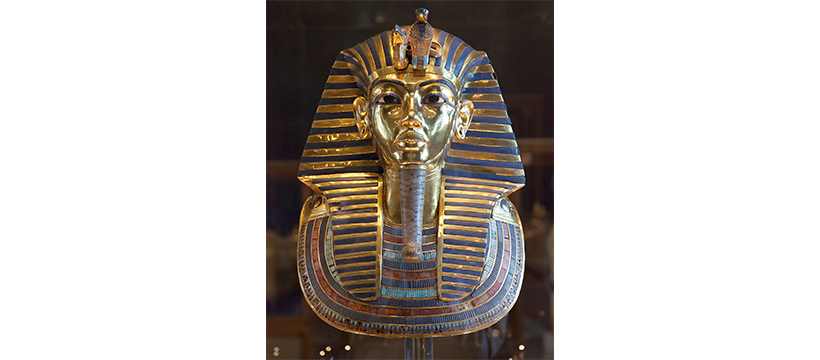Devotional – Wednesday, November 4, 2020

Today in History
The year was 1922. The date was November 4. George Herbert, fifth Earl of Carnarvon, owned the concession to dig in the Valley of the Kings, on the west bank of Egypt’s Nile River. He employed Howard Carter to supervise the excavations. Exactly 98 years ago today, one of Carter’s water boys accidentally tripped over a stone on the site. This would become the discovery of a lifetime.
The stone was the top of a stairway that led down to a sealed door. Carter reported the find to Lord Carnarvon who made his way from England to Egypt in 19 days. Together they descended the steps. Carter held up a candle to a tiny crack in the doorway, and Carnarvon asked, “Can you see anything?” Carter responded, “Yes, wonderful things!” The gold and ebony objects in the first chamber turned out to be just a fraction of the treasures to be uncovered.
Howard Carter had discovered the intact tomb of the 18th Dynasty Pharaoh, Tutankhamun. He was known as the child king since he took the throne at eight or nine years of age. His reign was from 1334-1325 BC, ending with his death before he was 20 years old. Tutankhamun was known for restoring the ancient Egyptian religion, enriching and endowing priestly orders of two cults. He was responsible for creating new statues of deities from the finest metals and stone, embellished with gold and silver. He also worked to re-establish diplomatic relations with other kingdoms, thus strengthening his reign.
It took Howard Carter nearly 10 years to evaluate and catalogue more than 5000 artifacts from the tomb. Most items were moved to the Egyptian Museum in Cairo. In celebration of the one-hundred-year anniversary of the discovery of the royal tomb, many of the objects are now on a world-wide tour: “King Tutankhamun, the Treasures of the Golden Pharaoh.”
It’s hard not to think about the Old Testament pharaohs when I hear about King Tut. For instance, remember the one Joseph worked for in Genesis? Joseph began as a slave but worked his way up to a position of power and authority. With the pharaoh’s blessing, Joseph was able to bring his family to live in Egypt and survive the famine. (Genesis 37-50) And what about baby Moses? He was set adrift in the bulrushes to avoid a different pharaoh’s orders to kill all the male babies. (Exodus 1-2:10). Later in life, Moses returned to Egypt to plead for the Israelites’ freedom. After the plagues, another pharaoh finally relented, then changed his mind. His armies’ pursuit of the Israelites to the Red Sea ended disastrously for the pharaoh. (Exodus 11-14.)
The discovery of the tomb of Tutankhamun, as well as the burial places of many other Egyptian rulers in the Valley of Kings, puts a spark of life into the Old Testament for me. Even though we don’t know the names of the pharaohs mentioned in the stories, we know the time frames at least roughly coincide. These pharaohs, with their own religions, cultures and motivations, were real people. The priceless objects placed in their tombs after their deaths tell us much about what was important during their lives. The contrast between the pharaohs’ exorbitance and the Israelites’ miserable enslavement provides insight about our God’s love for his chosen people.
I’ve heard it said that the Old testament is obsolete and irrelevant, but I don’t agree. Whenever Jesus needed some back up, where did he go? He didn’t have the New Testament — he used the law and the prophets to respond to his detractors and to explain his life on earth. For instance, when Jesus was explaining the story about a vineyard to the chief priests and leaders, he told them, “You surely know that the Scriptures say, ‘The stone that the builders tossed aside is now the most important stone of all. This is something the Lord has done and it is amazing to us.’” (Mt. 21:42). He was quoting directly from Psalm 118:22-23, referring to himself. When he was tempted three times in the wilderness, each time he relied upon what we know as the book of Deuteronomy: “Man does not live by bread alone, but by every word that comes from the mouth of God… You shall not put the Lord your God to the test … It is the Lord your God you shall fear,” (Deuteronomy 8:3; 6:16; 6:13).
We sing about this every Sunday:
Holy words long preserved
Excerpt from “Ancient Words,” by Michael W. Smith
for our walk in this world,
They resound with God’s own heart
Oh, let the Ancient words impart.
Thanks be to God.
Amen.
Offered by Mary Thompson
Our devotionals are sent by email on Monday, Wednesday, and Friday mornings, with an occasional lagniappe issue. Please look for these congregation devotionals in your email box at about 6:45 a.m. If you’d like to sign up to receive our mailings, please click here.
